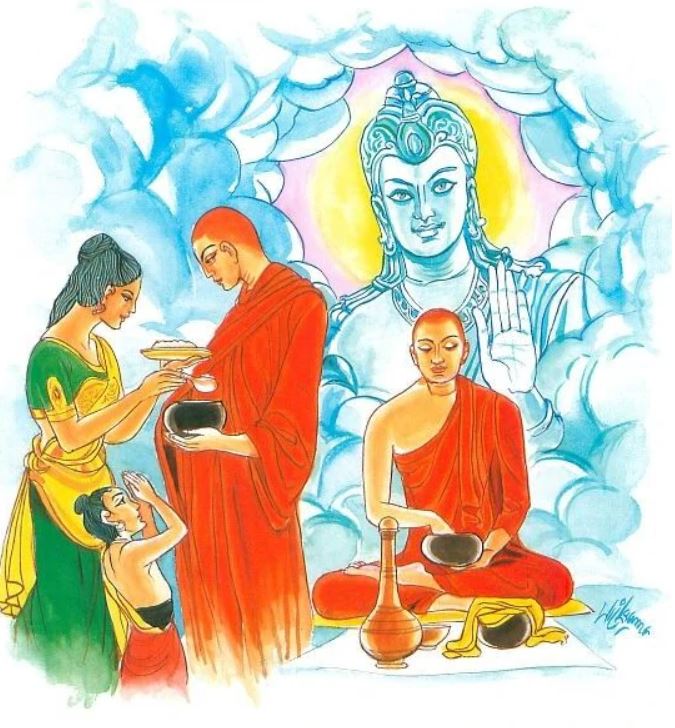Verse 168: Do not neglect the duty of going on alms-round; observe proper practice (in going on alms-round). One who observes proper practice lives happily both in this world and in the next.
Verse 169: Observe proper practice (in going on alms-round); do not observe improper practice. One who observes proper practice lives happily both in this world and in the next.
- dhammam sucaritam: proper practice. The Commentary says that here proper practice means stopping for alms-food at one house after another in the course of the alms-round except where it is not proper to go (such as a courtesan’s house).
-
na nam duccaritam: improper practice. Here it means not observing the above rules.
The Story of King Suddhodana
While residing at the Nigrodharama monastery, the Buddha uttered Verses (168) and (169) of this book, with reference to King Suddhodana, father of Gotama Buddha.
When the Buddha revisited Kapilavatthu for the first time he stayed at the Nigrodharama monastery. There, he expounded the Dhamma to his relatives. King Suddhodana thought that Gotama Buddha, who was his own son, would go to no other place, but would surely come to his palace for alms-food the next day; but he did not specifically invite the Buddha to come for alms-food. However, the next day, he prepared alms-food for twenty thousand bhikkhus. On that morning the Buddha went on his alms-round with a retinue of bhikkhus, as was the custom of all the Buddhas.
Yasodhara, wife of Prince Siddhattha before he renounced the world, saw the Buddha going on an alms-round, from the palace window. She informed her father-in-law, King Suddhodana, and the King went in great haste to the Buddha. The king told the Buddha that for a member of the royal Khattiya family, to go round begging for food from door to door was a disgrace. Whereupon the Buddha replied that it was the custom of all the Buddhas to go round for alms-food from house to house, and therefore it was right and proper for him to keep up the tradition.
Verse 168: Do not neglect the duty of going on alms-round; observe proper practice (in going on alms-round). One who observes proper practice lives happily both in this world and in the next.
Verse 169: Observe proper practice (in going on alms-round); do not observe improper practice. One who observes proper practice lives happily both in this world and in the next.
At the end of the discourse the father of Gotama Buddha attained Sotapatti Fruition.
Dhammapada Verses 168 and 169
Suddhodana Vatthu
Uttitthe nappamajjeyya
dhammam sucaritam1 care
dhammacari sukham seti
asmim loke paramhi ca.
Dhammam care sucaritarm
na nam duccaritam2 care
dhammacari sukham seti
asmim loke paramhi ca.
Source: Tipitaka








Jayesh Thakkar
Hope everyone is fine there. Good morning from here Jen.